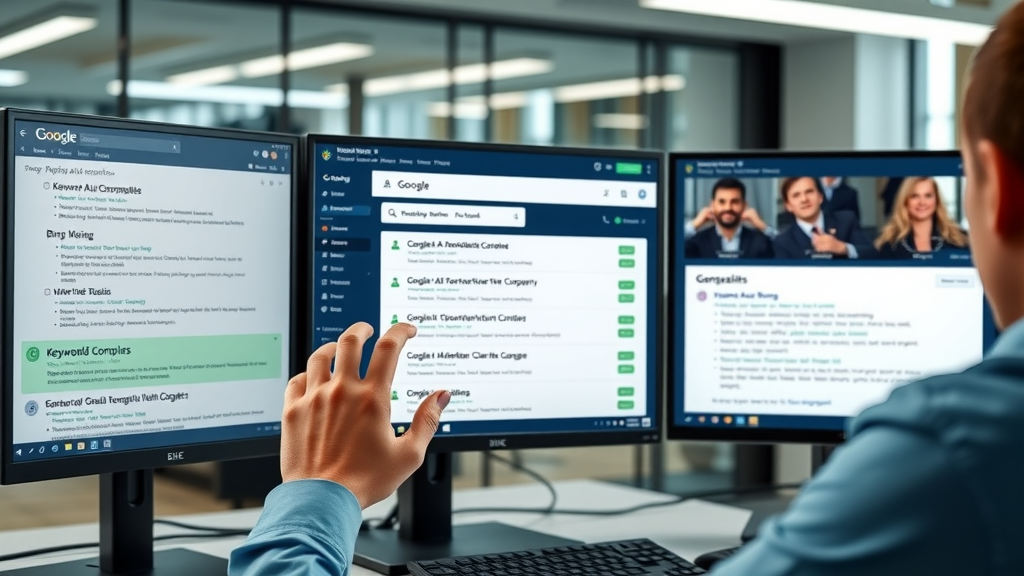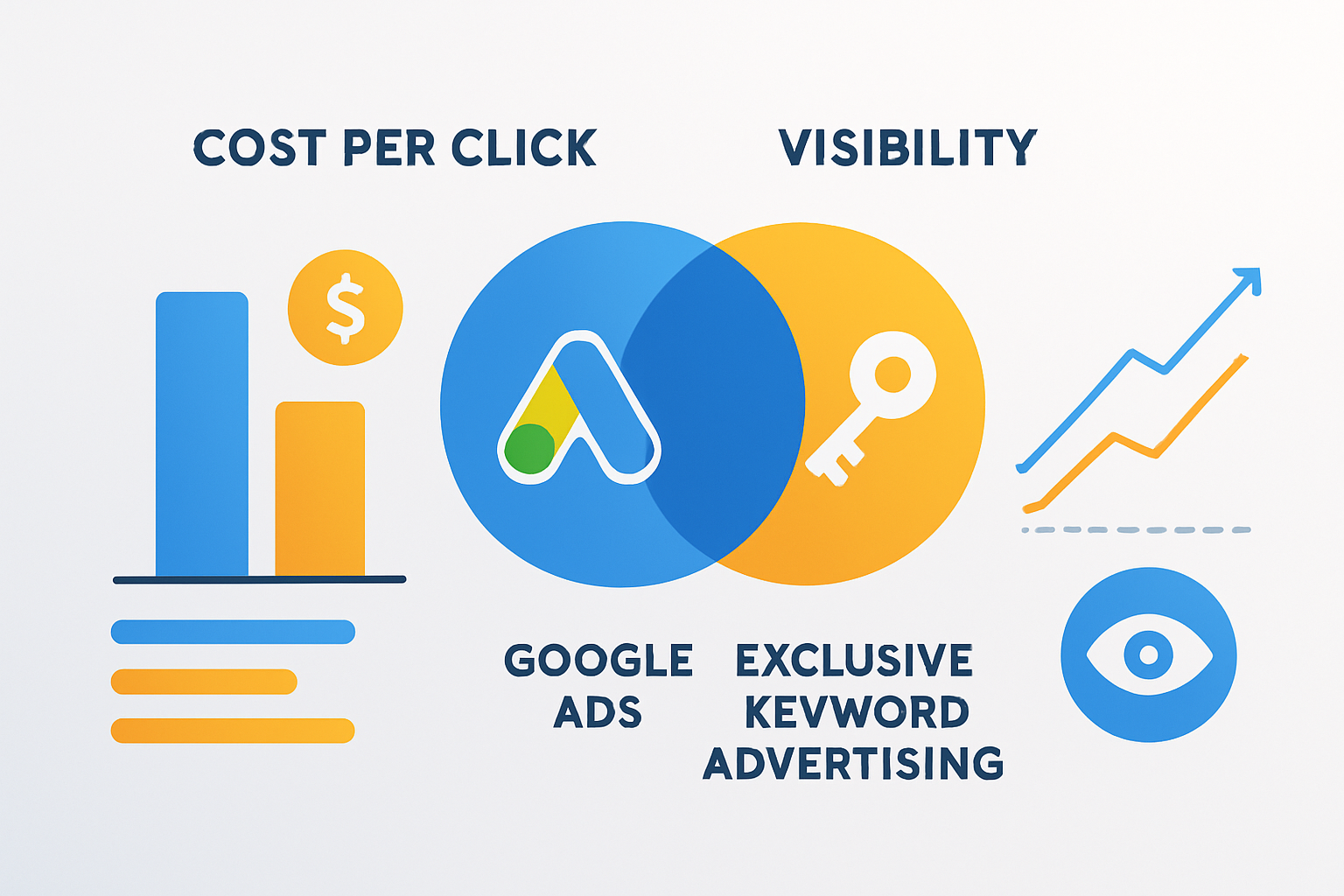Did you know that only 30% of people clicking on sponsored ads actually visit a business's website, while the majority get lost among countless competitors? For small businesses struggling to compete with giants who boast massive advertising budgets, standing out online can feel impossible. But what if you could own your local market by appearing first – and exclusively – where potential customers are already searching?
Explore how exclusive keyword advertising, combined with expert keyword research, can transform your visibility by placing your business front and center on Google and Bing autocomplete suggestions, without draining your budget.
Key Takeaways
Exclusive keyword advertising offers small businesses a unique strategy to dominate local search results.
It guarantees exclusive placement on Google and Bing autocomplete suggestions, dramatically enhancing your visibility.
The pay-per-result model ensures cost efficiency with capped monthly budgets tailored to your needs.
Expert keyword research and campaign management maximize your advertising return on investment (ROI).
This powerful approach enables small businesses to compete effectively against larger competitors with bigger budgets.
Startling Facts About Local Market Advertising and Exclusive Keyword Advertising
The Challenge Small Businesses Face in Competing with Big Budgets
Small businesses often find themselves trapped in a constant struggle to attract customers while juggling limited advertising budgets and managing effective search campaigns. Diane O'Brien of Digital Marketing All explains, The biggest challenge small businesses have is getting customers with limited budgets while competing against larger companies with massive advertising spend. For local entrepreneurs, this means their ads are rarely visible to their audience because big corporations dominate the top spots with heavy investments in Google Ads and other platforms.
Take plumbers for example. Running traditional Google Ads can cost from $6 up to $200 per click depending on location and keyword competitiveness. When the budget runs out quickly, small businesses risk disappearing from search results entirely, wasting precious marketing dollars with little return. Furthermore, traditional advertising platforms favor branding and entertainment-oriented content rather than targeting customers actively searching for services — making it even harder for service-based businesses to get noticed fast.

Understanding Exclusive Keyword Advertising and Its Role in Local Market Domination
What is Exclusive Keyword Advertising?
Exclusive keyword advertising is a groundbreaking method that ensures your business appears as the sole recommended option for specific, high-intent search terms – especially on Google and Bing autocomplete results. Unlike traditional ads that compete in auctions and bid wars, this strategy locks your brand into the autocomplete suggestions, making your business the first to catch a customer's eye before they hit enter.
This approach uses the natural behavior of search engines that anticipate user queries by suggesting completions as you type. For example, when someone types "plumber near me", your business will appear right alongside or within the autocomplete suggestions, reinforcing trust and increasing click likelihood before competitors even appear on the results page.
How Exclusive Keyword Advertising Differs from Traditional Google Ads and Broad Match Keywords
Traditional Google Ads rely on bidding for keywords within ad groups, often using broad match types that can show your ad for loosely related searches, draining your budget without precise targeting. In contrast, exclusive keyword advertising focuses on exact, highly relevant keywords, granting one business exclusive use per location. This removes the confusion and competition typically seen in pay-per-click models.
Instead of competing with dozens of other advertisers, your business is positioned right at the autocomplete phase of the search journey — a critical point when users are most focused on their intent. By locking in your brand with your keywords exclusively, you avoid outbids, fluctuating costs, and diminished quality scores common in traditional PPC campaigns.

The Importance of Keyword Research and Match Types in Exclusive Keyword Advertising
Successful exclusive keyword advertising hinges on thorough keyword research using advanced keyword research tools tailored to your specific business and customer search habits. Identifying high-intent, location-specific keywords ensures that you capture most relevant clicks, leading to higher conversion potential.
Match types matter greatly: exclusive keyword advertising prioritizes exact match types and carefully selected variations to maximize visibility without wasting impressions. By working with experts who analyze search volume, competition, and user behavior, businesses can secure the most optimal keywords for their market segment and budget.
For those looking to further refine their approach, understanding the latest SEO trends and how search engines are evolving is crucial. You can dive deeper into mastering modern search strategies by exploring how to make your business visible online with next-generation SEO techniques, which complements exclusive keyword advertising for even greater local impact.
The Mechanics of Exclusive Keyword Advertising: How It Works on Google and Bing
Leveraging Autocomplete Suggestions to Place Your Business Front and Center
When users start typing a query into Google or Bing, autocomplete suggestions instantly appear based on popular searches. Digital Marketing All has pioneered a technique that integrates your business name, relevant offers, or key services directly into these autocomplete dropdowns, effectively making it look like Google and Bing themselves recommend your business.
This increases click-through rates significantly by aligning your business name plus valuable keywords or specials right as customers search, for example "plumber near me – ABC Plumbing Emergency Services". This method interrupts the traditional search process by presenting an attractive, clickable suggestion before the user completes the search.
Exclusive Keyword Placement: One Business Per Keyword Per Location
A unique feature of this advertising method is exclusivity — only one business can own a specific keyword in a targeted location. That means if you secure the term "roofer Boston", no competitor in Boston will be able to buy that same keyword for autocomplete suggestions.
This eliminates direct bidding wars, protects your local market presence, and ensures consistent visibility. If multiple businesses want the same keyword, alternatives or closely related keywords are strategically sourced to maintain exclusivity without overlap.
Combining Google and Bing for Maximum Search Engine Coverage
While Google dominates search traffic, many users also browse with Microsoft’s Bing, especially since it powers the Edge browser on Microsoft devices by default. Diane O'Brien of Digital Marketing All points out that many users unknowingly use Bing through Edge, meaning your business could miss out on this significant audience if you only focus on Google.
Exclusive keyword advertising covers both Google and Bing simultaneously, capturing 100% of the search volume relevant to your keywords and location. This dual coverage increases your potential customer base and ensures no missed opportunities across top search platforms.

Benefits of Exclusive Keyword Advertising for Small Businesses
Guaranteed Visibility on the First Page of Search Results
When you use exclusive keyword advertising, your business dominates the entire first page of search engine results for your chosen keywords. This includes listings on Google My Business, Bing Places, social media posts, reviews, and even blog content aggregated around your brand.
This comprehensive presence builds instant credibility and trust. Customers feel confident contacting a business that appears everywhere relevant online. As Diane O'Brien emphasizes, "It looks like your business is being recommended by Google and Bing themselves".

Increased Click-Through Rates and High-Intent Customer Traffic
By appearing in autocomplete suggestions tied to high-intent searches, your business attracts visitors actively looking for your services — not just casually browsing. Studies show that about 30% of users click on search suggestions, with many proceeding to engage directly.
This is significantly higher than typical click-through rates for standard ads, which can be diluted by irrelevant impressions. The targeted nature of exclusive keyword advertising means you get more qualified leads for less wasted advertising spend.
Cost-Effective Pay-Per-Result Model with Budget Caps
Robin Johanson from Digital Marketing All explains, "With exclusive keyword advertising, small businesses can pay only for clicks they receive, capped at their budget, making it a sustainable and affordable marketing solution".
The pricing model averages around $2.50 - $10.00 per click — substantially lower than traditional ads which can cost up to $200 per click for competitive keywords. Plus, you set a fixed monthly budget with no surprises, and you never pay for more clicks than you agreed on.
Comparison with Google Ads: Why Exclusive Keyword Advertising is a Smarter Choice
Cost Per Click Differences: Exclusive Keyword Advertising vs. Google Ads
Google Ads pricing varies greatly, often climbing steeply for competitive keywords like legal services or roofing, impacting your quality score and overall ad copy effectiveness. This unpredictability makes budgeting difficult for small businesses. In contrast, exclusive keyword advertising maintains a set cost per click, allowing businesses to plan their spending better.
Avoiding the Bid War: Stability in Pricing and Keyword Ownership
Traditional PPC campaigns are essentially auctions, where competitors constantly increase bids to win top positions — driving costs upward. Exclusive keyword advertising sidesteps this by locking keywords per location, ensuring you never have to compete or risk losing your spot to a higher bidder.
Broader Reach Across Multiple Search Engines
Many small businesses overlook Bing despite it having a large share of search engine traffic, especially when using Microsoft’s Edge browser, making it a critical search engine to include in your search campaigns. Exclusive keyword advertising covers both Google and Bing in unison, ensuring maximum market penetration and exposure.

Implementing Exclusive Keyword Advertising: Step-by-Step Guide
Identifying High-Intent Keywords Relevant to Your Business
Start by analyzing the terms your potential customers use when searching for your products or services locally with a reliable keyword research tool. Using keyword research tools, marketers at Digital Marketing All evaluate search volumes, competition levels, and user intent to compile an optimized keyword list.

Selecting Exclusive Keywords and Locations for Maximum Impact
Next, select a geographic focus that matches your service area, from a single town to multiple cities or even national campaigns for large businesses. We recommend choosing around five exclusive keywords initially to cover core search phrases and relevant variations.
Setting Up Your Campaign with Digital Marketing All
The team at Digital Marketing All handles the technical setup, including linking your Google My Business and Bing Places listings, and configuring your autocomplete advertising campaign to display your business prominently across search engines.

Monitoring Performance with Google Analytics and Bing Reports
Once the campaign is running, detailed monthly reports are generated using Google Analytics and Bing Webmaster Tools, tracking impressions, clicks, and conversions. Businesses receive clear attribution thanks to customized taglines and tracking codes embedded in the autocomplete listings.
Keyword |
Search Volume (Monthly) |
Average CPC |
Match Type |
|---|---|---|---|
Plumber near me |
1,200 |
$6.50 |
Exact Match |
Emergency roofing Boston |
800 |
$12.00 |
Phrase Match |
Life insurance |
5,000 |
$54.91 |
Exact Match |
Financial advisor |
350 |
$20.00 |
Broad Match Modifier |
Funeral |
150 |
$9.00 |
Exact Match |
Best Practices and Expert Tips for Maximizing Your Exclusive Keyword Advertising
Optimizing Keyword Selection and Adding Relevant Variations
Refine your keyword list continuously to reflect seasonal trends, promotions, and changing consumer behavior using a keyword planner and research tool. Adding related keyword variations like “emergency plumber near me” or “affordable roofing Boston” helps capture a broader segment of your target audience while maintaining exclusivity.
Using Compelling Taglines and Offers in Autocomplete Suggestions
Incorporate attractive offers or taglines such as “20% off emergency services” or “Award-winning local roofing” directly in your autocomplete listings. This encourages clicks by providing an immediate value proposition to searchers.

Maintaining Consistent Monthly Budgets and Adjusting Based on Results
Set a monthly budget that aligns with your cash flow and growth goals, and adjust based on campaign performance and seasonality. Digital Marketing All offers flexible month-to-month plans, allowing you to scale up or down without long-term contracts.
Diane O'Brien recommends, "Focus on keywords that reflect your customers’ search intent and use exclusive advertising to ensure your business is the first and only option they see".
Common Questions About Exclusive Keyword Advertising
What is an example of keyword advertising?
Keyword advertising targets specific search terms to show your business in search engine ads or suggestions. For example, owning the term “plumber near me” exclusively in autocomplete suggestions ensures your business is recommended first when customers type that phrase.
What are the 7 main types of advertising?
The seven main types include TV, radio, print, online/digital, social media, outdoor, and direct marketing. Exclusive keyword advertising falls under targeted online digital marketing with a focus on search engine visibility.
What are high value keywords?
High value keywords are search phrases with large search volumes and high conversion potential, often costing more per click due to their popularity and commercial intent, like “life insurance” or “emergency roofing.”
What are the different keyword match types?
Match types control how closely a user’s search query must relate to your keyword, which is essential for optimizing your ad copy and improving your quality score. They include exact match (precise phrase), phrase match (words in order but with extra words), and broad match (general related searches). Exclusive keyword advertising focuses mainly on exact and carefully chosen phrase matches for precision.
Next Steps: Empower Your Small Business with Exclusive Keyword Advertising
Get ahead of the competition and secure your exclusive local market presence with a marketing strategy designed to maximize visibility on a small budget. By leveraging exclusive keyword advertising, your business can dominate search autocomplete suggestions on Google and Bing — putting you front and center for customers who are ready to buy.
Robin Johansson concludes, "Exclusive keyword advertising is a game-changer for small businesses looking to get noticed without breaking the bank".
Ready to take your marketing to the next level? If you’re interested in expanding beyond keyword exclusivity and want to explore holistic strategies that drive sustainable business growth, don’t miss our comprehensive guide on proven marketing tips and strategies for business growth. Discover actionable insights, advanced tactics, and expert advice designed to help you outpace competitors and future-proof your online presence. Whether you’re just starting or looking to optimize your current campaigns, this resource will empower you with the knowledge to make smarter marketing decisions and achieve lasting results.
Call to Action
If you would like to pay per result, rather than competing with companies with larger budgets, contact us at 207-710-1449.
I hope you enjoyed reading our blog. If you would like assistance with your marketing, give us a call at 207-710-1449 or visit our website at www.digitalmarketingall.org.
 Add Row
Add Row  Add
Add 








Write A Comment